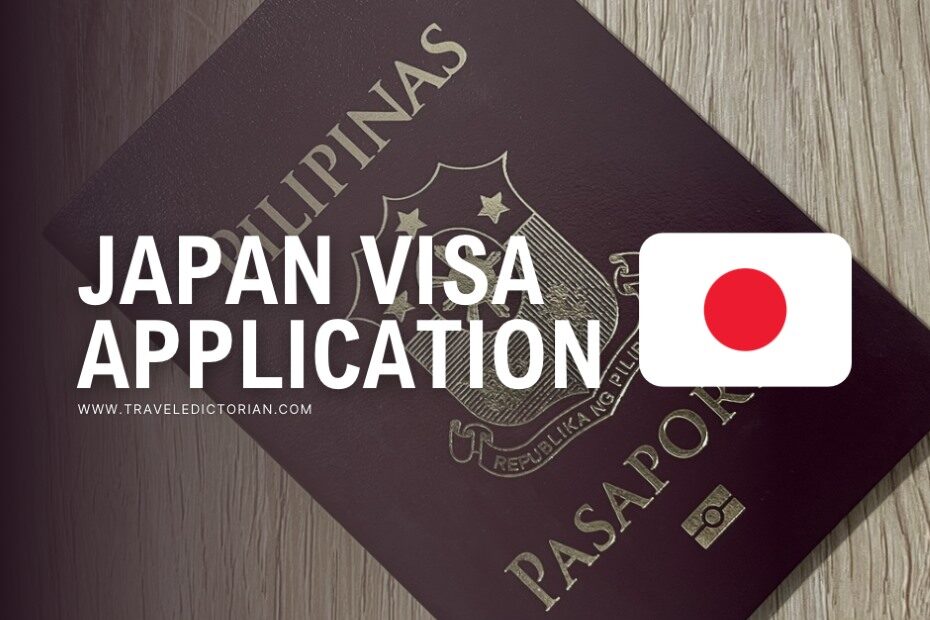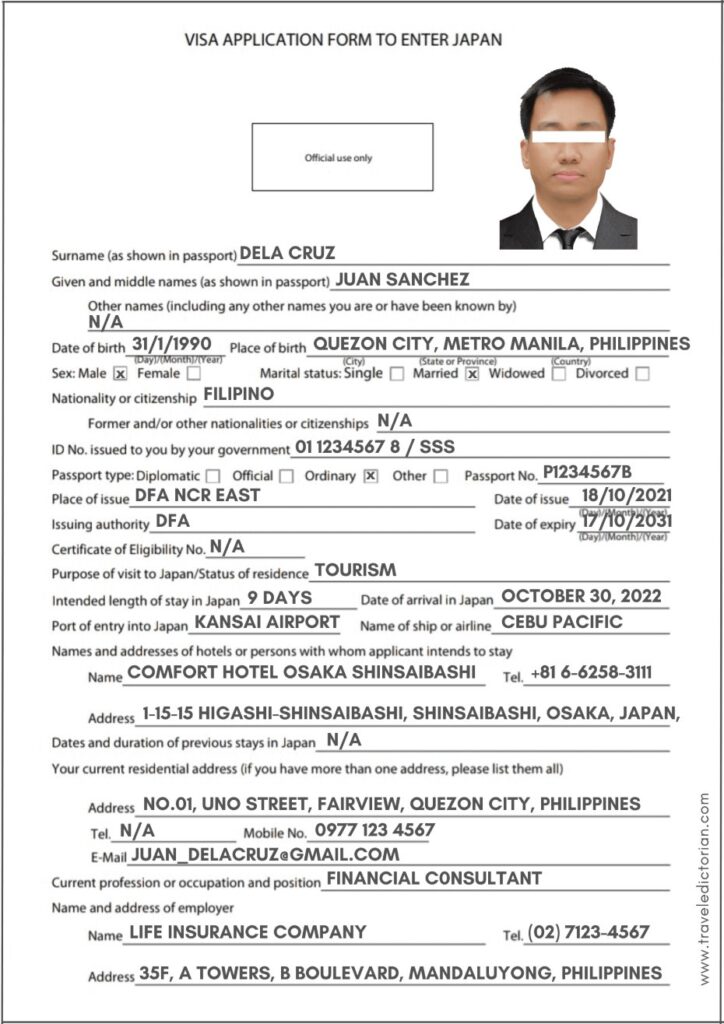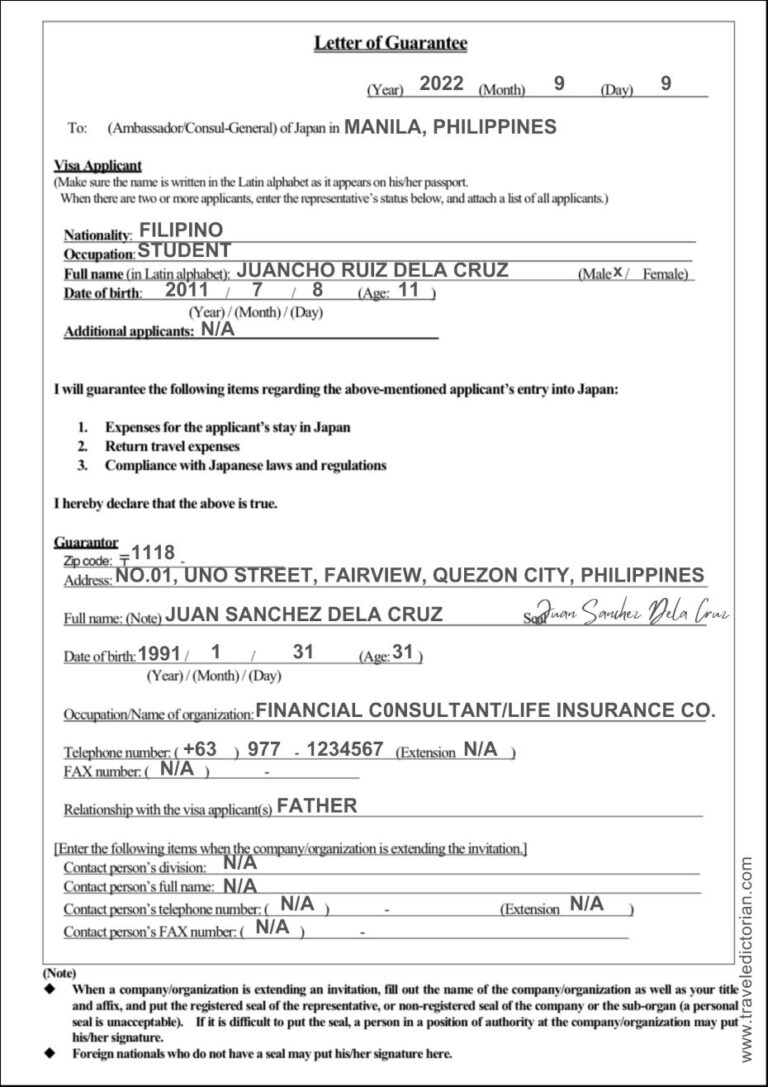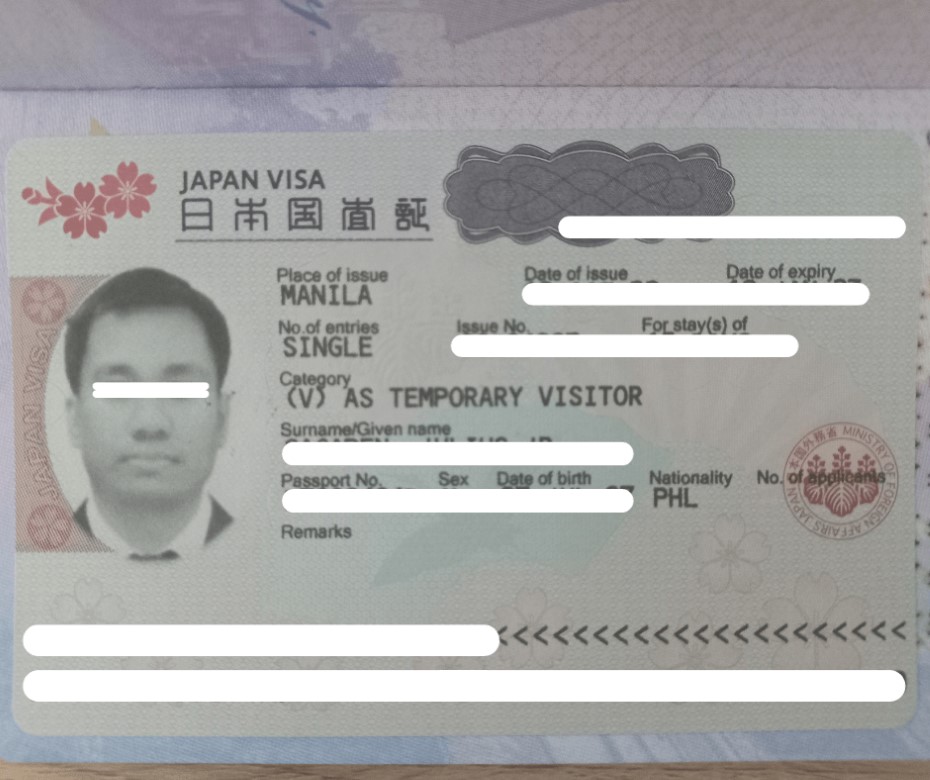
This article, “Japan Visa Application: A Guide for Philippine Passport Holders,” details the visa application process for Japan. Also, it has a full list of requirements essential in obtaining a Japan visa.
Disclaimer: Some information in this travel article changes too often. If you continue reading this article, you agree to cross-check information with the concerned authorities. Read the full terms.
Disclosure: This post may contain affiliate links. Thus, I earn a small commission at no extra cost to you for the purchases made through these links.
Introduction
Bearers of Philippine passports can travel to 37 visa-exempted countries and territories, including Singapore. However, since Japan is not yet included on the list, Filipino citizens must apply for and obtain a Japan visa.
Did You Know? The Japanese passport is among the most powerful in the world. Holders of Japanese passports can travel to more than 140 countries and territories without a need for a prior visa. Despite of having powerful passport, only a small percentage of the citizens prefers traveling overseas.
My plan to visit the “Land of the Rising Sun” had long been postponed due to my dread of being denied entry. However, after the approval of my long-awaited Japan visa application, the worry gave way to a great sense of happiness and pleasure.
The COVID-19 pandemic caused disruptions in the global tourism industry. But when Japan reopened its borders to international travelers in September 2022, I immediately sought a Japan tourist visa.
Compared to many other visa applications, the Japan visa application process is less complicated. Visa interviews are not even required as long as you have comprehensive documentation to support your travel intent. Below is an in-depth guide for Japan visa application:
1. Determine the Visa to Apply
A visa is an official endorsement added to a passport. It permits the holder authorization to travel to and from a foreign land within a specified period of time.
Japan, much like numerous other countries, grants a range of visas depending on the purpose of travel. As such, foreign nationals may apply for entry into Japan for leisure, employment, study, etc.
This article is meant for holders of Philippine passports who are currently residing in the Philippines and intend to file for a short-term tourist visa to Japan.
2. Gather All Requirements
Applicants for Japan visas are not required to appear in person for the submission of requirements. The applicant must, however, ensure that all documents for submission are valid and comprehensive.
Insufficient and erroneous documents may impede the visa application and, in the worst situation, lead to the denial of a Japan visa once forged documents become known.
Passport
The Philippine passport is an official document issued by the government of the Philippines to its citizens, which indicates the bearer’s identity. It authorizes holders to travel to overseas under its legal protection.
As the primary requirement for Japan visa application, it is important that:
- In order to be valid, the Philippine passport must be in good form and free of any damages, such as rips, folds, tampers, and unnecessary markings.
- It must remain in effect for at least six months from the intended departure.
- The passport book must have at least two remaining blank pages.
- Submit two clear copies of the bio found on the second page of the passport.
- The signature of the bearer must be affixed on the third page of the passport.
- Remove the passport holder, cover, or case from the passport book.
Application Form
The “Visa Application Form to Enter Japan” is a two-page document that requests the applicant’s personal and travel information. Additionally, the guarantor’s pertinent details are sought on the form.
In the case of group applications, such as family members traveling together, individual applications need to include their pertinent information on the “List of Visa Applicants” form. Either of the parents, member of the family, or anyone who can fund for the trip may serve as the representative.
The Embassy of Japan pays close attention to specifics. For this reason, ensure that all of the details asked on the Visa Application Form to Enter Japan is filled out accurately and thoroughly. A few essential reminders are stated below:
- A properly filled-out application form needs to be electronically written using an “Arial” font in size 12.
- Handwriting is also accepted. The relevant information provided must, however, be written clearly and erasures-free and in all caps using black pen.
- Put the abbreviation ‘N/A’ in all fields if the details requested are not applicable or not available to the applicant. In addition, put a cross mark in the boxes that correspond to your answers. Importantly, don’t leave each item blank.
- Affix a signature and the application date using a black ink once the application form is carefully filled out.
- On a separate A4-sized paper, write down the names and contact information of all additional accommodations in Japan.


A sample of a duly accomplished “Visa Application Form to Enter Japan”
Photo
A headshot of the applicant is among the fundamental requirements for a Japan visa application. The applicant, however, must follow the photo specifications.
- The photo must be taken within the last six months from the date of application.
- Photo dimension must be 35 mm x 45 mm or 3.5 cm x 4.5 cm.
- Colored photos must be taken in a white backdrop.
- The image must be high resolution and pixelated-free.
- Write down the full name and birthdate at the back of the photograph.
- Avoid stapling the photo. Seal the photo with a glue on the upper right corner of the application form instead.
Birth and Marriage Certificates
A copy of the applicant’s certificate of live birth and, for married Filipino couples, their certificate of marriage must be obtained for the purposes of identification. These identity documentation must, however, adhere to the following guidelines:
- The certificates of live birth and marriage are PSA-certified true copies acquired from the Philippine Statistics Authority offices or any PSA Serbilis Centers.
- It must be issued within a year upon submission of the visa application.
Japan Visa Application Reminder: The applicant may additionally provide supporting documentation if there are discrepancies with the marriage and birth certificates.
- In the event of unclear documents, provide a PSA-certified true copy of birth and marriage certificates with a copy from the local civil registry.
- For a late-registered certificate of live birth, furnish a copy of the baptismal certificate or academic records with contact details of the institution.
- In case of no record, submit a copy of the “Negative Certification” from PSA together with a copy of the certificate of live birth from the local civil registry. Moreover, as to married couples, submit a ”Certificate of No Record” with a copy of the marriage certificate from the civil registry.
Itinerary
Create a schedule of events that outlines the places to see and the things to do. Make it simple and easy to understand so as to illustrate that the trip is entirely intended for leisure purposes only.
The itinerary must also contain information about the preferred flight schedules and accommodation, in addition to the day-to-day activities. However, all purchases and prior reservations are not yet required.
Download the “Itinerary in Japan Form” and refer to our “Daily Schedule of Activities.” For a comprehensive guide, see our 9-day itinerary, which commence in Osaka.
Bank Certificate
The cost of living in Japan is among the highest in Asia. Hence, it is imperative that the applicant have a consistent source of income to fund the trip, as shown on their bank certification. But the financial record needs to meet the following requirement:
- The bank certificate must be issued within the previous three months from the date of Japan visa application.
- It must be original and duly signed.
- The financial record must specify the bank account name and number. In addition, the document must clearly indicate the type of account, opening date, average daily bank balance, and remaining amount.
Japan Visa Application Tip: The Embassy of Japan does not disclose a minimum bank balance one must have in a bank. A sudden large deposit to your account, however, might result in the application’s disapproval.
Income Tax Return
Employees, entrepreneurs, and professional practitioners wishing to obtain a Japan visa need to furnish a copy of their income tax return, or ITR. It serves as reliable proof of the applicant’s sound financial standing.
Employees are required to submit a copy of a duly accomplished BIR Form 2316, or the Certificate of Compensation Payment/Tax Withheld. But it must satisfy these criteria:
- The annual income tax return must be the most recent issued copy.
- Submit a duplicate copy of the form on A4-sized bond paper.
Business owners, professional practitioners, and independent contractors are required to submit their BIR Form 1701 or 1702, or the Certificate of Annual Income Tax Return.
- The annual income tax return must be the latest issued copy.
- Provide a clear photocopy of the form on A4-sized bond paper.
Japan Visa Application Tip: Provide the following records to substantiate the applicant’s sound financial status in the event that the ITR is not readily available:
- Employed applicants must submit a valid certificate of employment and a clear photocopy of their company ID. It must specifically include in the certification the applicant’s job title, hiring date, compensation, and the company’s contact details.
- Those who conduct business must also furnish photocopies of their DTI and SEC-issued permits, BIR registration, and mayor’s or business permits. On the other hand, self-employed individuals and freelancers are allowed to submit copies of their transaction receipts or payslips.
Application for Sponsorship
Minors, students, retirees, housewives, and those who are unable to fund their travel expenditures may apply for a sponsorship. A sponsor is a person or an organization that has the capacity to shoulder the sponsee’s travel expenses. They can be an immediate family member, relative, spouse, friend, partner, or an institution. Here are additional requirements:
Letter of Guarantee
A “Letter of Guarantee for Japan” is a two pages document in which a person or an institution binds to be legally and financially responsible in behalf of the guarantee. It contains the information of both parties; the guarantor and the guarantee.
- The duly accomplished Letter of Guarantee for Japan must be computerized using an “Arial” font in size 12.
- Handwriting is permitted. The information provided is, however, written legibly, in all caps, and free from erasures using black ink.
- Put the abbreviation ‘N/A’ in all fields if the details asked are not applicable or not available to the applicant. In addition, put an “x” mark in the box that corresponds to your answer. Do not leave anything blank.
- Attach the signature, or the organization’s official seal, with the application date once the form is completed.

A sample of a duly accomplished “Letter of Guarantee” form
Proof of Relationship
If the applicant is seeking sponsorship, a valid and PSA-certified true copies of birth and marriage certificates are essential to prove ties with the sponsor. For sponsors who are not related, such as acquaintances, furnish photos together and screen grabs of previous conversations or emails.
Proof of Financial Capacity
In addition to the letter of guarantee and proof of relationship, furnish original copies of the sponsor’s financial records, primarily bank certifications, statements, and annual income tax returns.
3. Set an Appointment
The Embassy of Japan has streamlined the Japan visa application process for Filipinos. Thus, applicants are required to schedule an online appointment through the VFS Global website. Here are simple instructions on how to make an appointment with the VFS Global in the Philippines:
Find the Appropriate VFS Website
The Visa Facilitation Services, or simply VFS Global, is an organization that handles and administers visa and passport processing services. Locating the proper VFS Global website for the preferred country – the VFS Global website for Japan in the Philippines – is important given the company’s vast global clientele.
Enroll a VFS Account
To proceed with the Japan visa application, create a VFS account to gain access to their appointment portal.
Fill-out the Web Form
Register your personal identification, such as the full name, date of birth, citizenship, and contact and passport details. Additionally, include the most preferred schedule of appointment, date and time slot, and Japan Visa Application Center, or JVAC, of choice. Here are key locations to file your Japan visa application:
- Gateway Tower Mall, Level 3, Araneta City, Cubao, Quezon City, Metro Manila
- Makati Circuit Corporate Center, Tower 2, Groud Floor, A.P. Reyes St. Brgy. Carmona, Theater Drive Circuit, Makati City, Metro Manila
- Parqal Mall, Building 5, Level 3, Diokno Avenue corner Macapagal Boulevard, Brgy. Tambo, Paranaque City, Metro Manila
- Faustina Center, Unit 9, 7F, Cabahug St., Bonifacio District, Kasambagan, Cebu City, Cebu
- Felcris Centrale, FES-09, 2F, Brgy. 40-D, Quimpo Blvd., Tolomo, Davao City, Davao del Sur
Japan Visa Application Reminder: If seeking a schedule as a group, you will need to file separate appointments for each member.
Pay the Service Fee
Once the appointment has been confirmed, settle the service charge amounting to PHP 520.00 online through debit or credit card. Alternatively, pay with cash on the day of the appointment.
Japan Visa Application Tip: The Japan Visa Application Center (JVAC) in the Philippines also offers added services for your convenience. You may opt to avail yourself of the following services for a fee:
Premium Lounge Plus – PHP 3,970.00, Premium Lounge – PHP 2,200, Courier Fees – PHP 370.00, Form Filling – PHP 300.00, Photograph – PHP 180.00, SMS Reminder – PHP 150.00, and Photocopy Service – PHP 5.00
Get Confirmation
After the booking process is completed, the applicant will then receive a confirmation as well as letter of appointment.
4. Submit the Requirements
In-person application is a must, and be at the designated Japan Visa Application Center at least 15 minutes ahead of the appointment. Bring the valid passport together with the duly accomplished application form and all supporting documentation, both original and photocopied. Additionally, bring the letter of appointment and copy of payment receipt.
Japan Visa Application Reminder: The VFS Centers are open from Monday through Friday, with the exception of holidays, from 7:00 a.m. to 4:00 p.m.
5. Wait for the Result
Upon completion of the entire Japan visa application process, the applicant will be handed a slip that contains the reference number and date of birth. It will be used to track the status of the application online. In addition, updates will be sent via email and paid SMS service.
The processing period for a short-term visit normally ranges between 5 to 7 business days upon acceptance of the Japan visa application. However, visa processing time may lengthen for some reasons, including high application volume and incomplete and inaccurate documentation. Therefore, it is imperative to proceed with the application at least a month before the intended trip.

A sample of a Japan visa sticker placed in the passport page.
6. Claim the Passport
Expect an electronic mail or an SMS, for those who availed the paid service, once the result of the Japan visa application has been made and the passport is ready for collection. Bring with you at least one valid government-issued ID and the original copy of the application receipt.
Moreover, prepare a letter of authorization together with each of the applicants valid government-issued IDs if a representative will pick up the passports on their behalf.
Following the approval of the Japan visa application, the applicant will receive their passport with visa. But if the application is disapproved, only passport will be returned to applicant. Thus, the applicant may reapply after six months.
Japan Visa Application Reminder: The Embassy of Japan does not disclose any specific reasons for the applicant’s ineligibility to obtain a Japan visa. Besides the insufficiency of financial resources, instability of employment, and inconsistency of documents, lack of travel history is probably a factor in visa denial. As such, establish travel history and visit visa-free countries and territories, like Hong Kong and Taiwan.
Frequently Asked Questions
When is the earliest possible time to apply for a Japan visa?
Stary your application between one and two months before your intended travel. This will guarantee you sufficient time to address arising concerns with your application while it is in the process.
How long is the validity of a tourist visa in Japan?
The period of validity for a visa is the interval between the issuance and expiration of a visa. Applicants for a short-term stay visa, like tourist visas, are permitted a set period of time to remain in the country.
A single-entry tourist visa grants entry to Japan once within a 90-day period, which commences from the first day the visa was issued. However, your stay is limited to no more than 15 days.
A multi-entry tourist visa, on the other hand, allows you to enter Japan more than once for 3 or 5 years upon visa issuance. A visitor can remain no more than 15, 30, or 90 days, depending on the embassy’s discretion.
Japan Visa Application Tip: There are no concrete rules as to how often a multi-entry visa holder can visit Japan. But it is a rule of thumb to travel intermittently so that the immigration can’t cast doubt on the specified travel intent.
Can I include other supporting documents other than the primary requirements?
To substantiate sound financial standing, the applicant may submit additional documents, like land titles, stock certificates, insurance policies, and so forth.
Does a cover letter have to be included in the visa application?
No. A cover letter, however, helps you justify related concerns you may have with your application. For instance, an explanation for unsubmitted documents.
Is it possible to apply for a multi-entry visa for the first time?
Yes, provided that the applicant is qualified. The applicant, or the guarantor, possesses sound financial standing. The likelihood of obtaining a multi-entry tourist visa for the initial application is further increased with an established travel history.
However, I suggest filing for a single-entry visa when visiting the country for the first-time.
Is it necessary to purchase flight tickets or make hotel reservations before applying for a Japan application?
At your discretion. However, the Embassy of Japan does not encourage buying a plane ticket or make a hotel reservation prior to the visa application. The embassy will not be held liable for the unused flights or hotels once a visa is denied.
How much money does one need to have in a bank?
Although financial resources are taken into account when applying for a Japan visa, the Embassy of Japan withholds a specific sum. That being said, provide the highest possible bank savings account to commensurate with Japan’s high cost of living and the number of intended days.
Final Thoughts
The Embassy of Japan has outlined significant considerations when applying for a Japan visa. However, the approval or denial of the visa application may entirely depend on the applicants’ clear intentions and the capability to travel through their documents. At the end of the day, it still lies in the hands of the Japan Embassy to determine whether the applicant is eligible for a stamp of approval.

About the Author
J. Sac is the author of “Japan Visa Application: A Guide for Philippine Passport Holders.” He is also the founder of Traveledictorian – a travel blog that publishes well-crafted travel content.
His passion for writing, photography, and travel fueled him to explore parts of Asia and soon the rest of the world. He also plans to undertake humanitarian work in his future travels. Read his inspiring story and follow him on social media!
P.S. Subscribe to our newsletter for the newest travel guides and the latest updates in the travel industry.
when a college student is planning to travel with a parent as a guarantor, does his guarantor has to apply also for a visa or travel with him? can the college student travel solo with his parent as his guarantor? How about in the case of a nephew traveling with his aunt as guarantor, what document to show their relationship as a birth certificate may not be useful in this case? thank you in advance
Hello there, Ms. Rowena.
Yes. A college student (nephew, or the like) may submit the visa requirements and travel solo to Japan for tourism purposes provided that he has a guarantor to finance the entire duration of the trip. Other than the applicant’s primary visa requirements (see article), he must also secure essential supporting documents :
1. Accomplished Letter of Guarantee. You can download the template/form in my article.
2. Proof of Financial Capacity. It must be the most recent and original copy of Bank Certificate and Income Tax Return, ITR, (photocopy) of the guarantor.
3. Proof of Relationship. PSA-certified copies of Birth Certificates of the applicant, guarantor, and the applicant’s parents for the purposes of kin verifications.
Although not a requirement, It is good to prepare a Letter of Explanation to detail the applicant’s relationship to the guarantor.
I also encourage you to contact or visit any Attic or Reli Tours and Travel Agency branches in major malls for supporting information as visa requirements to Japan must be submitted to a third party agency.
Hope this helps!
Related article: How to Avoid Getting Offloaded at Philippine Immigration?
P.S. Please subscribe to my site’s newsletter and follow and share Traveledictorian’s official social media accounts. Thank you and God bless!
Helo po, wala po tlga signature ng mag guarantor doon sa guarantee letter? Thanks!
Hi Ezel Mae,
Thank you for visiting my site. Please see the revised “Guarantee Form” for your reference. You may also verify it through the embassy. Thank you!
Hi Traveledictorian,
I’m planning a trip to Japan this coming December, and my itinerary includes visiting two different prefectures, which means I’ll be staying in two separate hotels. I’d like to ask if I need to indicate both hotel names and addresses when submitting my travel details.
My concern is that the available field/space might not be sufficient to include information for both accommodations.
Thanks in advance for your help!
Best regards,
Hello there, Jarianne,
Thank you for visiting my site. Yes, please do indicate all the hotels you are staying with. In the event of multiple accommodations, please provide a additional sheet, preferably in a table form, with complete details.
Hope this information helps you. Looking forward to your Japan trip soon. God bless!
Traveledictorian
P.S. If you find my work interesting, please follow any of my social media accounts, @traveledictorian. Again, Thank you!
Thanks for the prompt response. However, in the application form, there’s a very little space/fields available to indicate the hotel name and address together with the phone number. Do you have a sample “additional sheet, preferably in a table form, with complete details”?
thanks in advance
hello there, my 71 year old aunt who lives in the US plans to visit Japan this April. My family of
three will accompany her. However, the expenses will all be shouldered by her, can I indicate in our visa application that she is our guarantor. Does she need to submit financial requirements too.
thanks!
Best Regard,
Hello there, Ms. Ellaine! In connection to your concern, your family of three may apply for “sponsorship,” provided that all necessary requirements are adhered to. You may include the following requirements in addition to the fundamental documents as stated in my article.
Letter of Guarantee
A duly signed “Letter of Guarantee to Enter Japan” from your aunt. (Please download the form included in the article.)
Proof of Relationship
Please furnish a copy of your aunt’s birth certificate to prove ties. In addition, you may opt to submit a copy of either your mother’s or father’s birth certificate to prove that either of them is a sibling to your aunt. It also helps to include copies of your photos with her.
Proof of Financial Capacity
Does your 71-year-old aunt possess assets, funds, savings, or pension that demonstrate her financial capacity to cover the full duration of your Japan visit? Please provide copies of her financial records in the form of bank statements, bank certificates, stocks certificate, real estate certifications, among others.
Thank you and good luck with your Japan visa application. 🎌